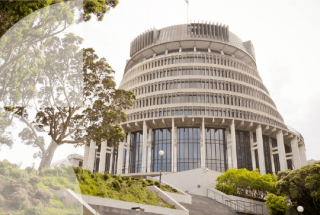New Bill extends enforcement powers under the LGA

New Bill extends enforcement powers under the LGA
Friday 15 September, 2017
A Member’s Bill from The Honourable Jonathan Young (National MP), the Local Government (Freedom of Access) Amendment Bill (‘Bill’), was introduced to Parliament on 8 June 2017.
The Bill addresses –
- The effects of occupier-style protests on Council-administered land, in which structures and tents are erected, restricting the public’s use of and access to the affected land; and
- The obstruction of enforcement officers or Council agents when exercising their statutory functions under the Local Government Act 2002 (‘LGA’).
The Bill seeks to provide a better balance between the rights of Councils to protect their property; communities’ right to access and use Council land; and the rights of members of the public to express their opinions in the form of protests and demonstrations on Council land.
The Bill proposes to do this by –
- Widening the scope, under section 164 of the LGA, of enforcement officer powers to remove property from Council land.
- Extending the offence provisions in section 178 of the LGA, relating to refusal to provide certain information or the provision of false or insufficient particulars, to be available for use by enforcement officers.
- Giving constables powers of arrest without warrant, for non-compliance with directions to give identifying details; and for obstructing, impeding, or preventing enforcement officers or agents of local authorities from carrying out their statutory functions and duties (under sections 178 and 229 of the LGA).
Inconsistencies with NZBORA identified by Attorney-General
The New Zealand Bill of Rights Act 1990 (‘NZBORA’) requires the Attorney-General to report to Parliament on any bills that contain provisions that appear to be inconsistent with that Act.
Power of arrest without warrant
The Attorney-General’s (Hon Christopher Finlayson) report of 3 August 2017 advises Parliament that part of the Bill appears to be inconsistent with section 22 of the NZBORA (liberty of the person) and cannot be justified under section 5 of that Act.
The inconsistency relates to the proposed power of arrest without warrant for a person’s failure to provide his/her name, address or the name, address and whereabouts of any other person connected in any way with an alleged offence. The Attorney-General considers the discernible purpose of the proposed amendment to the LGA to be the coercion of information - which is arbitrary, and without reasonable cause. In such circumstances, a constable’s power of arrest is considered disproportionate and without appropriate safeguards to mitigate against that disproportionality.
The Attorney–General has advised Parliament that the inconsistency could be remedied by removing the proposed amendment to section 178 of the LGA and, also, the power of arrest without warrant for non-compliance with directions to provide information under that section.
Power to seize and impound
The proposed amendment to section 164 (introducing a new subsection (1A)) of the LGA gives enforcement officers the power to seize and impound property that has been erected, placed or fixed on Council administered land and that has been in place for more than five days in a 12 month period (without the necessary consent). For the ‘avoidance of doubt’, the amendment makes it clear that the new powers apply to property ‘erected, placed, or fixed for the purposes of a protest or demonstration.’
Along the same lines as the current restrictions on the power of seizure and impoundment under section 164(1) of the LGA, an enforcement officer will be required under section 164(1A) to first direct the owner of the offending property to remove it; inform him/her that the officer has the power of seizure and impoundment if it isn’t removed; and provide the person with the ‘necessary time to remove that property without delay’.
The Attorney-General considers this amendment is consistent with section 14 of NZBORA (the right to freedom of expression, including the freedom to seek, receive, and impart information and opinions of any kind and in any form) because, in summary –
- The objective of the amendment is to prevent health hazards, damage to property and restriction of the use of public land during protests and demonstrations, which is ‘sufficiently important to justify the limitation on section 14’ of the NZBORA.
- Property is required to be in place for five days in any 12 month period before it can be removed; providing ‘at least a minimum necessary level of rational connection to the objective’.
- By requiring enforcement officers to notify the owner, the amendment places a limit on the exercise of the removal power, so that the limitation on section 14 of the NZBORA ‘is no more than necessary to achieve, and is in due proportion to’ the Bill’s objective.
- The power is to be exercised by enforcement officers who are bound (by section 3 of the NZBORA) ‘to act consistently with the rights guaranteed’ under the NZBORA.
Enforcement officers’ powers of seizure and impoundment of property under section 164 of the LGA, currently apply only to property materially involved in the commission of a breach of the LGA or Council bylaws. Whilst Council bylaws often contain provisions which prohibit or limit access to, and use of, Council land (including the erection of structures, tents etcetera on that land), such provisions have been the subject of successful legal challenge in the past - on the basis that they amount to an unreasonable limitation on the rights and freedoms affirmed in the NZBORA.
Widening the statutory power to property which has been erected, placed or fixed on Council land without consent, will no doubt be welcomed by Councils - particularly those who have faced the many challenges involved in removing long-term occupiers of public land.
We will keep you informed on progress of the Bill.
NZBORA considerations
The Attorney-General’s application of the NZBORA principles to the provisions of this Bill may also provide useful guidance to Councils when making determinations under section 155 of the LGA as to whether or not a proposed bylaw gives rise to any implications under, or is inconsistent with, the NZBORA.
Please contact Bridget Parham if you want to learn more about the issues discussed in this article.
To view the Local Government (Freedom of Access) Amendment Bill, click here.
To view the Attorney-General's report on Local Government (Freedom of Access) Amendment Billl, click here.




